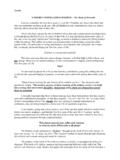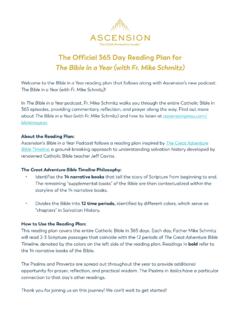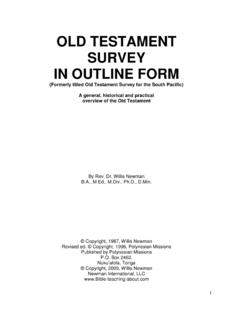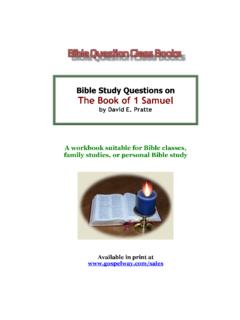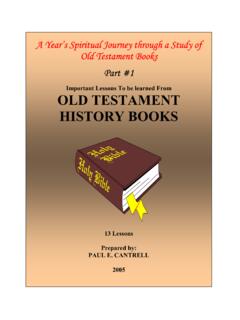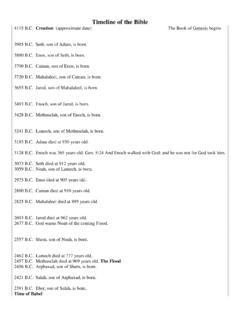Transcription of Studying the Psalms
1 Studying the Psalms 1 Studying the Psalms In the past I felt that the Psalms , while wonderful expressions of adorations to God, were apparently disjointed and unassociated one with the other. Most were magnificent praises that David, and others, expressed to Almighty God, while others expressed confession, repentance, regret, even, prayers of retribution upon enemies. After searching inquisitively, taking a closer look into each Psalm, I found what others must have known down through the years. I learned that each Psalm had a message to teach and that there was far more connection and relationship between the Psalms than I realized.
2 I discovered that the Psalms were actually songs written to be sung by the Old Testament Hebrew saints, and the early New Testament Church. In fact, they were the songs Jesus sang when He lived on earth. The purpose of this study is to provide a brief summation of each Psalm, an annotation for each chapter, to be read prior to the reading of a Psalm. Hopefully each synopsis will provide a deeper understanding of why a certain Psalm was written under what circumstance was it penned and what message it has for the Church and us, personally today! The Psalms were written in Palestine and Babylon from about 1,500 to 450 100 of the Psalms have names prefixed to them.
3 They are: Moses (1); David (73); Solomon (2), Asaph (12); Heman (1) Ethan (1), and the sons of Korah (10). David and Solomon wrote several of the remaining 50 without authors names, as is shown in the notes. Authorship of others cannot be determined. Ezra is perhaps the collector and compiler of the Psalms in their present form. The Hebrew title of Psalms is Sepher Tehillim, meaning, The book of Praises. The English Psalms is from the Greek title Psalmoi, meanings, songs. This word is translated Psalms 7 times in the New Testament (Luke 20:42; 24:44; Acts 1:20; 13:33; 1 Corinthians 14:26; Ephesians 5:19 and Colossians 3:16). The word Psalter is from the Greek, Psalterion, meaning a harp, or other stringed instruments.
4 The 150 Psalms are divided into 5 books in the Hebrew Bible for some unknown reason, if not to correspond with the 5 books of Moses or the Pentateuch. Psalms as we have it today is just like it was when Christ used the book. Book 1 called the Genesis book of Psalms (chapters 1 through 41) Its general theme concerns man God s counsels from the beginning to the end in relation to man. It begins, like Genesis, with God s blessing upon man (Genesis 1-2 with psalm 1), showing him that his blessedness consists in obedience to and occupation with God s word. It continues with man s fall and rebellion (Genesis 3-11 with Psalms 2-15). It ends with hope of redemption through Christ (Genesis 12-50 with Psalms 16-41), concluding with a benediction and a double Amen (Psalm 41:13).
5 Book 2 called the Exodus book of 31 Psalms (chapters 42 through 72) Its general theme concerns Israel as a nation Israel s ruin, Redeemer, and redemption. It begins, like Exodus, with a cry from the depth of ruin and despair (Exodus 1-3 with psalm 41-42). It continues with God s mighty works of deliverances (Exodus 4-15 with psalm 44-50) and with backslidings, defeats by enemies, and hardships (Exodus 16-27 with Psalms 51-55). It ends with God s redemptive work for Israel and His reign over them (Exodus 19-40 with psalm 56-72). It concludes with a benediction and a double Amen (Psalm 72:19). Studying the Psalms 2 Book 3 called the Leviticus book of 17 Psalms (73 through 89) Its general theme concerns the Sanctuary and its purpose concerning God and man.
6 The book begins with the Sanctuary as related to man, revealing the basis of fellowship with God, (Leviticus 1-7 with Psalms 73-83). It continues with the Sanctuary as related to God, showing the walk and relationship of the redeemed before God (Leviticus 8-27 with Psalms 84-89). In nearly every psalm of this book the Sanctuary, and man s relation to it are mentioned. It concludes with a benediction and a double Amen (Psalm 89:52). Book 4 called the Numbers book of 17 Psalms (chapters 90 through 106) Its general theme concerns Israel and the Gentiles on earth the counsels of God revealing no hope for man in the earth apart from God. It records the walk of man in his earthly pilgrimage to a better world and a better life.
7 It begins with Israel in the wilderness taking account of themselves (Numbers 1-8 with Psalms 91). It continues with proper order, and instructions for the future (Numbers 9-14 with Psalms 91-94), rest anticipated (Numbers 15-26 with Psalms 95-100), and the basis for entering into rest (Numbers 27:36 with Psalms 101-106). It concludes with a benediction, one Amen, and one Hallelujah (Psalm 106:48). Book 5 called Deuteronomy book of 44 Psalms (chapters 107 through 150 It concerns God and His Word, showing that all blessings of man (Book 1), of Israel (Book 2), of the Sanctuary (Book 3), and of the earth and all men (Book 5), are based upon obedience to the Word of God (Deuteronomy 8:3).)
8 Disobedience brought man s sorrows, Israel s dispersion, the Sanctuary s ruin, and earth s miseries; and it is only by obedience to God s Word that these curses will be removed. While several divisions distinguish the other books, this book is, like God s Word itself, a perfect whole. It is the only one of the 5 books with an even number of Psalms . Keep in mind as you read through the Psalms , as I stated earlier, that the book of Psalms was what we would refer to as a, hymn book for the Old Testament saints and the early Church. Each Psalm was written to be sung! Psalm 1 First Psalm of the Righteous (godly and ungodly contrasted) The Happy Man. This is a Psalm of instruction concerning good and evil, setting before us life and death, the blessing and the curse, that we may take the right way that leads to happiness and avoid that which will certainly end in our misery and ruin.
9 The different character and condition of godly people and wicked people, those that serve God and those that serve Him not, is here plainly stated in a few words; so that every man, if he will be faithful to himself, may here see his own face and then read his own doom. That division of the children of men into saints and sinners, righteous and unrighteous, the children of God and the children of the wicked one, as it is ancient, ever since the struggle began between sin and grace, the seed of the woman and the seed of the serpent, so it is lasting, and will survive all other divisions and subdivisions of men into high and low, rich and poor, bond and free; for by this men's everlasting state will be determined, and the distinction will last as long as heaven and hell.
10 This Psalm shows us, (I) The holiness and happiness of a godly man, verses 1-3. (II) The sinfulness and misery of a wicked man, verses 4-The 1st Book of Psalms The Genesis Book: Concerning Man ( Psalms 1 through 41) Studying the Psalms 35. (III) The ground and reason of both, verse 6. Whoever collected the Psalms of David (probably it was Ezra) with good reason put this Psalm first, as a preface to the rest, because it is absolutely necessary to the acceptance of our devotions that we be righteous before God (for it is only the prayer of the upright that is His delight), and therefore that we be right in our notions of blessedness and in our choice of the way that leads to it.
